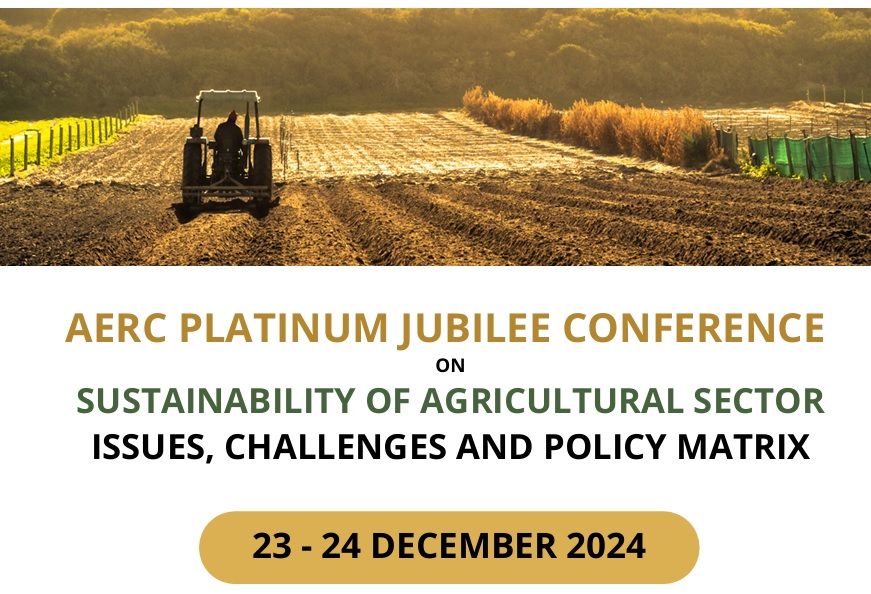
AERC PLATINUM JUBILEE CONFERENCE 2024
AERC PLATINUM JUBILEE CONFERENCE ON
SUSTAINABILITY OF AGRICULTURAL SECTOR ISSUES, CHALLENGES AND POLICY MATRIX
23-24 DECEMBER 2024
Agriculture is not just about GDP; it is the backbone of our economy and society: said Shri Shivraj Singh Chouhan at the Platinum Jubilee of the AERC at the Gokhale Institute
“We have seen that in a country like India, we have a real trace of wonderful and very prominent agricultural research and technological know-how, including the canal system, reservoir system for agriculture, and many more incidences which we have found because India is largely an agrarian society,” said Dr Shankar Das, Vice Chancellor (Interim) of the Gokhale Institute, while delivering his address, highlighting AERC’s seven decades of impactful agricultural research and its contributions to India’s agrarian economy since its establishment in 1954.
The Agro Economics Research Centre (AERC) celebrated its Platinum Jubilee Conference on the “Sustainability of Agricultural Research and the Agricultural Sector” on 23 December 2024, hosted by the Gokhale Institute of Politics and Economics, Pune. Prof Vijay Paul Sharma, Chairman, Commission for Agricultural Costs and Prices graced the event as the guest of honour along with Shri Shivraj Singh Chouhan, Union Minister, Ministry of Agriculture and Farmers Welfare as the chief guest of the event. Prof Jayanti Kajale, Director AERC was also present at the event as one of the speakers.
Addressing challenges like climate change and youth disengagement, Dr Das proposed solutions such as pesticide banks and psychological support, stating, “Innovation is key to tackling farmer suicides.” He also praised recent government programs for their transformative impact.
“Today, our agriculture policy, program, or scheme is not production-centric; its central point is our farmers’ welfare,” remarked Prof Vijay Paul Sharma, emphasising a paradigm shift in agricultural policy over the past decade, with a focus on farmer welfare inspired by Prime Minister Narendra Modi’s vision of doubling farmers’ incomes. He identified key challenges, including resource depletion, climate variability, and fragmented markets, which hinder farmers from realizing fair prices.
“Today, our agriculture policy, program, or scheme is not production-centric; its central point is our farmers’ welfare,” he remarked, emphasizing a paradigm shift in agricultural policy over the past decade. He identified key challenges, including resource depletion, climate variability, and fragmented markets, which hinder farmers from realizing fair prices.
Calling for a renewed focus on technology, infrastructure, institutional reforms, and farmer incentives, Prof. Sharma envisioned a sustainable and equitable agricultural ecosystem. “If we work on these four things—technology, infrastructure, institutions, and incentives—our problems will be solved to a great extent,” he concluded, urging collaborative efforts to address challenges and ensure long-term progress.
“We must follow traditions while using technology, avoiding practices that could harm future generations. Natural farming, when done properly, does not reduce yield but improves the quality of produce, whether it is fruits, vegetables, or grains,” said Shri Shivraj Singh Chouhan while highlighting the need to bridge the gap between agricultural research and its application on the ground.
He emphasized translating lab innovations into farmer-friendly tools through scientist-farmer collaboration and resources in regional languages to overcome technology transfer barriers. “What science is doing must directly benefit the farmer,” he said, underscoring the importance of making research accessible and actionable.
“Agriculture is not just about GDP; it is the backbone of our economy and society,” he said, adding that India aspires to not only feed its population but also become the food basket of the world. His vision for the future is one where technology, tradition, and policy converge to create a resilient and prosperous agricultural ecosystem.
“The first study that started in the institute was on marketing of fruits in Pune district in 1931, which traced the journey of fruits from producers to consumers or what is known as supply chain in today’s parlance,” said Prof Jayanti Kajale, highlighting the Gokhale Institute’s significant legacy in agricultural economics research, starting with its pioneering 1931 study on fruit marketing in Pune.
Prof Kajale also said, “The centre has completed evaluation of the central sector scheme of Agri Infra Fund under the Concurrent Feedback Program of the ministry,” emphasizing the centre’s crucial role in shaping agricultural policies through evidence-based research and recommendations.
“The theme of the conference is broad and addresses not only issues and challenges but also policies relating to sustainability of the agricultural sector,” said Prof Jayanti Kajale highlighting the occasion marking 70 years of the AERC’s contributions and focus on sustainability in the agricultural sector.
While expressing gratitude for the continued support from various government bodies, Prof Kajale said, “The support of the state government is extremely important for conducting studies at AERC.”
The event celebrated the achievements of AERC while calling for a collaborative, technology-driven approach to secure a sustainable and prosperous future for agriculture in India.
YouTube Link Click Here